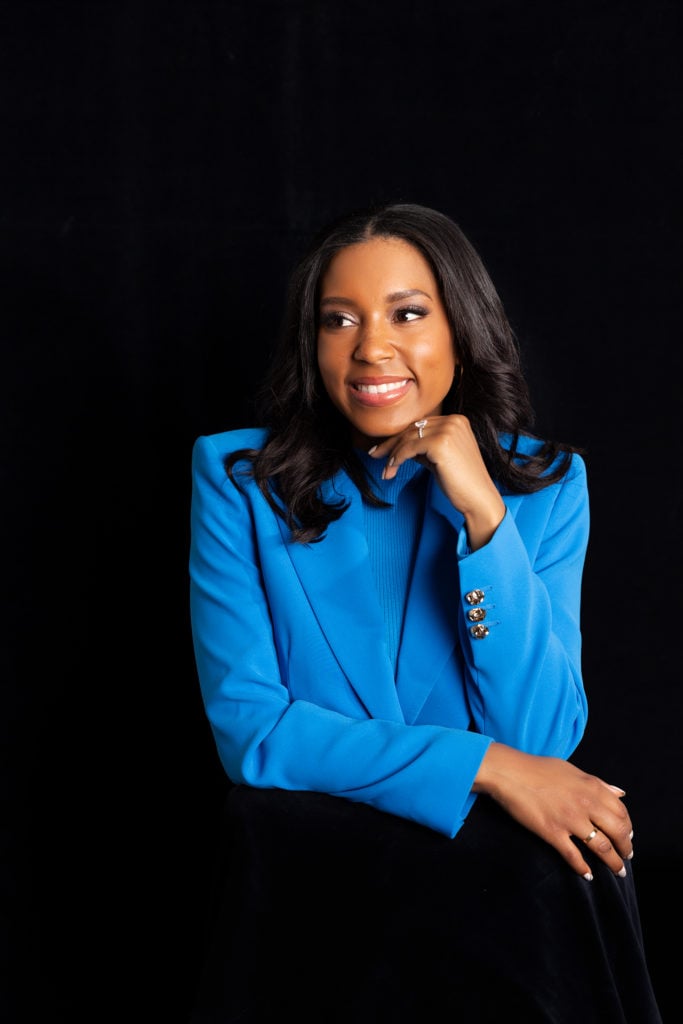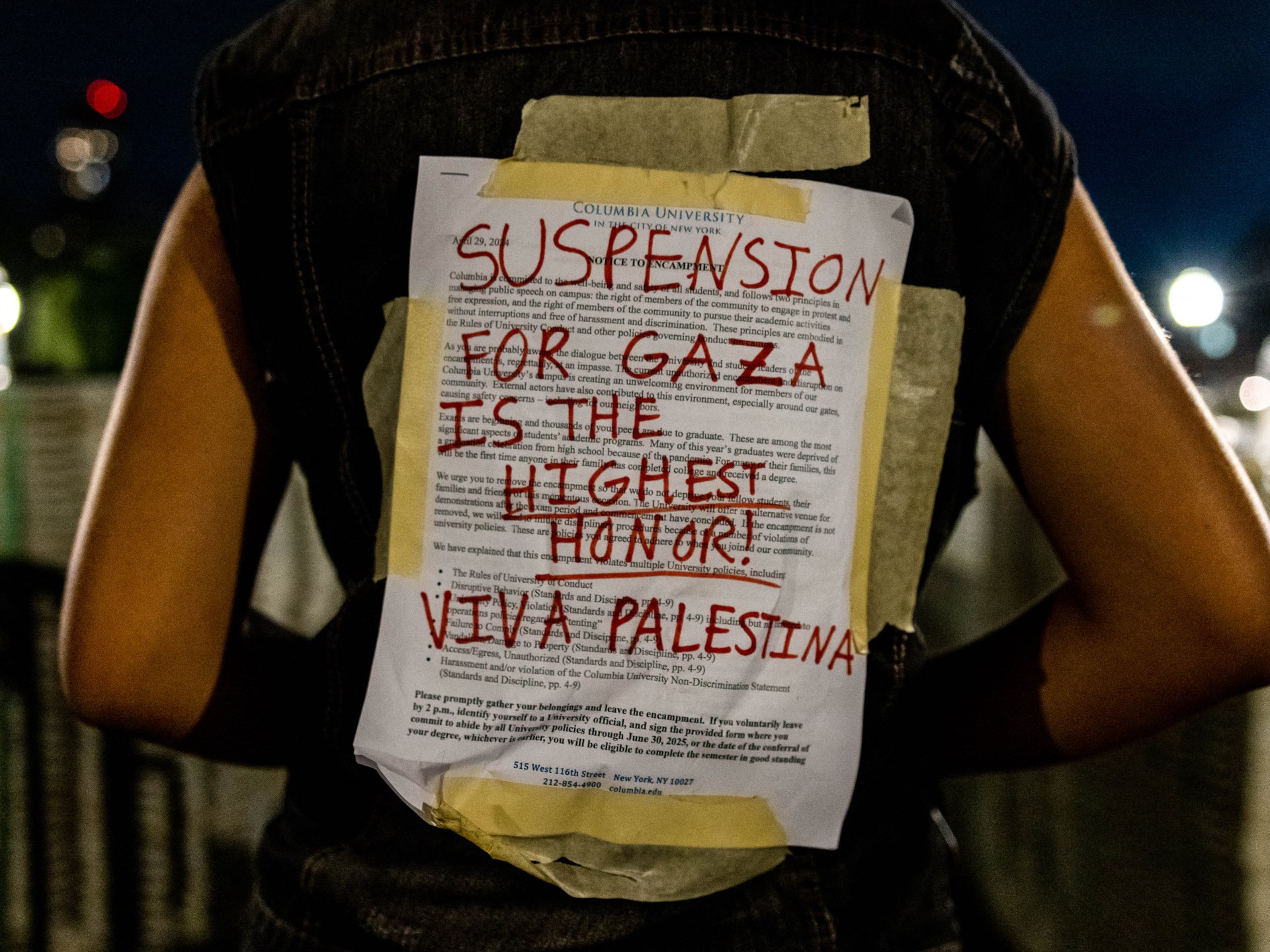PHILADELPHIA — So much of the joy in sports is based on the expectations that precede a celebration, on the circumstances in which an accomplishment is achieved. So here were the Washington Capitals — not those old Stanley Cup-contending Washington Capitals, but a different version with an altered reality — gathered in a grinning group on the ice at Wells Fargo Center. They vigorously patted each other on the heads, gloves knocking helmets around. And then, with a playoff berth locked up, they bounced as one, a circle of glee following a season of unspeakable grind.
Washington
Perspective | For the Caps, an ‘unreal,’ ‘unbelievable’ triumph keeps a surreal season going

With their bite-the-nails-to-their-nubs 2-1 victory over the Philadelphia Flyers Tuesday night, the Capitals returned to the NHL postseason, nabbing the final wild-card berth in the Eastern Conference, essentially winning Game 7 of Round 0. In doing so, they earned a date with the behemoth New York Rangers. Exhale, because the spot was earned, and the ride was worth it. Now, buckle up again.
But enjoy this much: A team that dealt with underperformance and injury, that banished Stanley Cup hero Evgeny Kuznetsov and got better because of it, that still sold at the trade deadline because the immediate future seemed bleak — that group sneaked in. No, sorry. That group won its last three games in four days to barge in when no other result would have worked.
“Unreal,” said Alex Ovechkin, whose first-period goal was the 31st of his season, the 853rd of his career, and given the way the Caps have been scoring lately, felt something like a miracle.
“We fight through lots of stuff that happen at [the] deadline, injuries, Kuzy,” he continued. “But I think the belief inside the locker room was tremendous. We enjoyed that process. It’s special. That’s why we play hockey.”
And that’s why we watch.
Put the achievement aside for a moment. The wackiness in how it came about can scarcely be overstated. With two points Tuesday — in regulation or overtime — the Capitals would clinch the final spot. But to stay alive, the Flyers needed a regulation win — and help in the form of Montreal beating Detroit.
That meant that a tie late in the game — and the possibility of overtime, in which the Caps would earn their 90th point, eliminating Philadelphia — essentially put the Flyers in a deficit.
So for Philadelphia Coach John Tortorella, pulling goalie Samuel Ersson would come earlier than normal — with more than three minutes remaining, and the score tied. Except at almost that exact same moment nearly 400 miles away, Detroit scored with five seconds left to force overtime in Montreal. The Red Wings had their point. The Flyers were eliminated. Ersson vacated the net anyway — and Caps vet T.J. Oshie, playing with a chronically messed-up back, deposited the game-winner into the empty net.
How fitting — how crazily fitting — for this group.
“Almost every game was Game 7 for us,” Ovechkin said. “Sometimes didn’t get points and we’re still in a battle, and then it was a crazy situation ’til tonight.”
“I got info on the Detroit game right after they scored their empty-netter,” Tortorella said. “I think it happened pretty close together.”
Insanely close together — and for Washington, insanely fortunate. Because this team — which scored two or fewer goals in 42 of 82 games this year, fourth-most in the NHL — didn’t seem capable of forcing another one through if the game stayed five-on-five. That struggle to score contributed to the Caps’ minus-37 goal differential, the worst of any playoff team this century.
They are limited, sure. And yet, there’s so much joy.
“You could see the faces in that room, whether you’re John Carlson or you’re Hendrix Lapierre, Connor McMichael, ‘O,’ they all have different things,” said first-year coach Spencer Carbery, who has been nothing but impressive in methodology and messaging. “They’re all at different stages of their careers and their lives.
“But you could tell no matter what your situation, whether you’re playing in your first year, like a lot of our guys, or you’re playing in your 17th season, this group — you could tell how bad they wanted to find ways to win every night.”
It’s so striking what skin-of-the-teeth qualification means to this roster when cast against how those old juggernaut Capitals teams barreled into the playoffs. In the Cup year of 2018, the most notable aspect of the Caps’ celebration after their first-round victory over Columbus was how subdued it felt. That was a business trip. The second round was expected. What was important was on the horizon, beyond.
These Caps aren’t those Caps. And that’s okay.
“The momentum is on our side,” Oshie said. “I think there’s a lot of players in this room that maybe haven’t been deep in the playoffs or haven’t even played in the playoffs that are starting to learn the dedication and the focus and the intensity and the selflessness that it takes to play playoff hockey.”
Because they have been playing that style for more than a month.
Before the season, the keys to the Capitals being the best version of themselves figured to be a return to form of Kuznetsov, the talented but maddening center who was arguably Washington’s best player during the run to the Cup. They included a return to health of franchise linchpin Nicklas Backstrom, who had to come back from hip resurfacing surgery.
And they probably included a stellar year from goaltender Darcy Kuemper, signed a season earlier to a five-year, $26.25-million contract to bring stability to a position where Washington had enjoyed little.
The results: Kuznetsov was the worst version of himself, dragging the team down, managing just 17 points in 43 games. He was placed on waivers, then traded. Backstrom’s physical limitations quickly became too much. He stepped away from the sport in November with just one point in eight games. And Kuemper was eventually replaced in net by stellar backup Charlie Lindgren, who started 14 of the Caps’ final 15 games and was deemed by Carbery “arguably our MVP.”
So the group that gathered in the fall with hopes of returning to the playoffs isn’t the group that ultimately landed there. The lineup Tuesday night included defenseman Dylan McIlrath, days from his 32nd birthday but playing just his 75th NHL game, the captain of the Caps’ top minor league franchise. Darned if he didn’t assist on Ovechkin’s goal. It included 21-year-old Vincent Iorio, a 2021 draft pick playing his ninth NHL game. This is a hybrid roster for a franchise in transition, the old core winding down and a new core just forming — maybe.
“It’s unbelievable, just because the journey, it hasn’t been easy,” Lindgren said. “ … It’s such a privilege to play for these guys.”
They will be underdogs, and heavy underdogs, against the Presidents’ Trophy-winning Rangers. The kids on this team won’t remember the burden New York has to bear, but maybe some old heads will. The 2010 Capitals won that very same trophy issued to the team with the best record in the NHL. They lost in the first round to eighth-seeded Montreal. The 2016 and ’17 versions of the Caps earned Presidents’ Trophy status and couldn’t make it out of the second round.
The point: Nothing is guaranteed. Washington’s lineup isn’t what it once was or even what it was expected to be this year. But the kids who might well be part of a future core — McMichael, Lapierre, Beck Malenstyn, Aliaksei Protas and others — get this chance following a season in which so much went wrong.
“Just to where we’ve gotten is very, very valuable for development,” Carbery said. “But now, you want to make good on it. Now, we don’t want to just [say], ‘Okay, great.’ We want to play well. …
“And everybody’s going to say, ‘We’ve got no business being here, and the goal differential, blah, blah, blah. That’s going to be the narrative. And that’s fine. It’s warranted. It’s a fact. [But] I know this group isn’t just going to be content showing up in the Stanley Cup playoffs.”
When the horn sounded Tuesday night, Carlson — now with 1,009 NHL games, all in a Caps sweater — pumped his fist and wailed, then headed to Lindgren for an emphatic embrace. The standard isn’t what the standard was. But for these Capitals, this season was a success. Now, the real fun begins.

Washington
PSC, faculty mediators dispute NYU account of encampment negotiations – Washington Square News
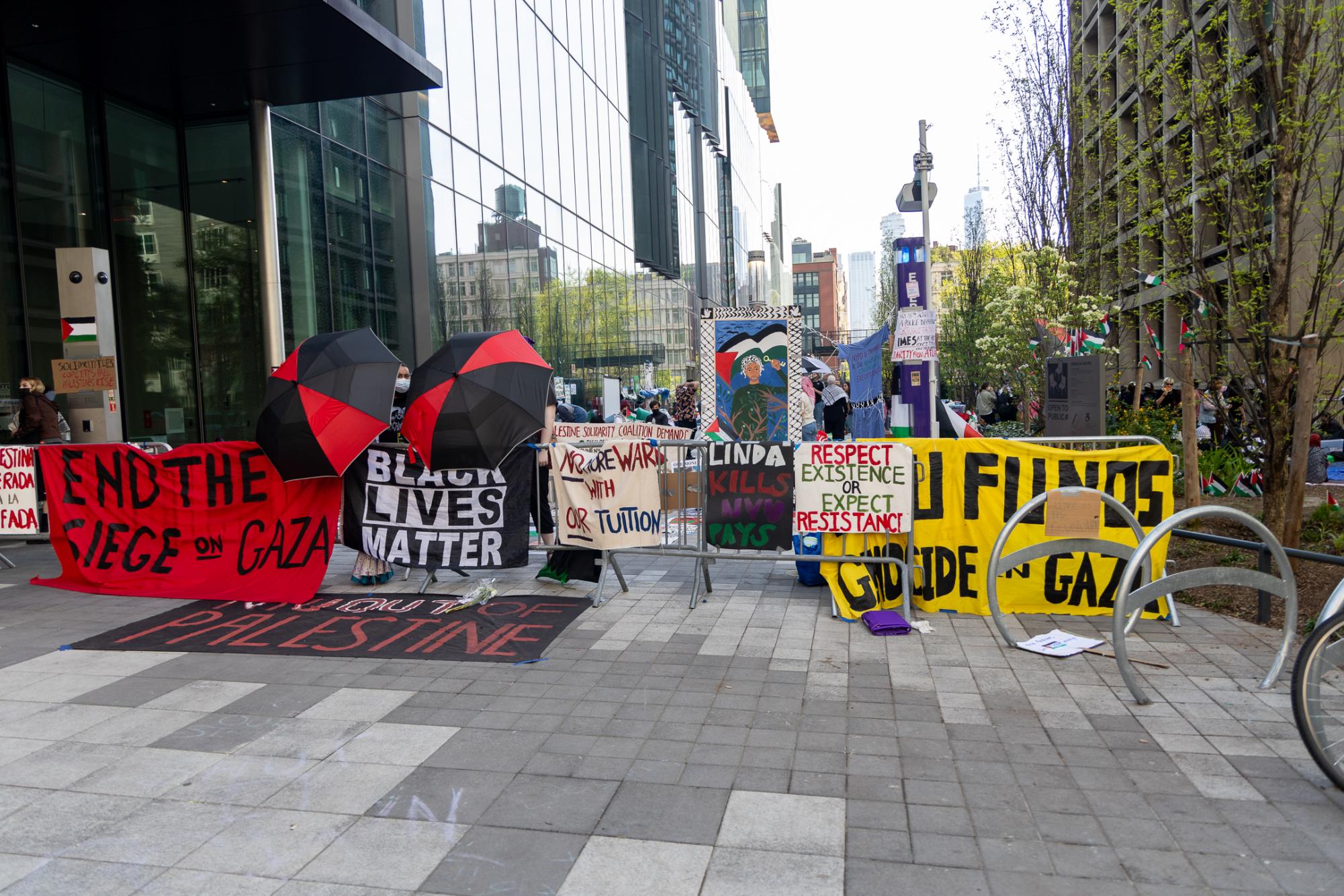
After NYU said it would proceed with disciplinary action against protesters at the Gaza Solidarity Encampment — citing students’ failure to respond in negotiations and decision to remain at the demonstration — NYU’s Palestine Solidarity Coalition and faculty mediators denied the university’s account of student meetings with administrators, calling it “disingenuous” and “misleading.” NYU PSC also said negotiations are currently “at a standstill.”
In a statement yesterday afternoon, NYU spokesperson John Beckman said protesters had agreed to leave the encampment in exchange for “many hours of discussion” with administrators on Saturday, and that “students failed to honor that promise.” Beckman cited a last-minute decision “that all demands must be met as well” for students to leave the encampment as having caused negotiations to fall through on Saturday. He said the decision came at the insistence of “others, including, we believe, outsiders.”
Beckman also said that the next day, NYU gave protesters two options: to cease overnight stays at the encampment and proceed with discussions, or continue staying overnight and face conduct charges. According to his statement, students did not respond to the university’s proposals.
In a statement in response to the university, NYU PSC challenged Beckman’s account of events, saying student organizers had discussed all four of their demands from the beginning of negotiations. Protesters’ demands include the disclosure of the university’s investments, divestment from companies with ties to Israel, the closure of NYU Tel Aviv, the removal of police from campus and the pardoning of disciplinary action taken against pro-Palestinian protesters.
NYU PSC said the university had offered to disclose its investments and pardon the protesters arrested at Gould Plaza if demonstrators agreed to leave the current encampment during the nighttime, but that student protesters refused it. The group also said negotiations are currently “at a standstill.”
“The students have made it clear what the only appropriate resolution is,” NYU PSC’s statement reads. “We will not de-escalate, we will not de-camp and we will not rest until this university cuts every last tie, monetary or otherwise, from the Zionist project.”
Three faculty mediators who were present at the negotiations backed much of NYU PSC’s account of events in a letter to administrators. The professors said the university’s statement misinterpreted communications about student organizers’ decision-making process as involvement by “outsiders” in negotiations. They called for NYU to issue an apology for and retract its statement on the negotiations.
“We also note that this is the second time since Monday April 22, 2024, that NYU has released an official statement describing events in tendentious ways without accurate information,” the letter reads. “At best, this pattern of misrepresentation demonstrates incompetent communication among senior administration. At worst, it indicates a reckless and calculated disregard to the safety and well-being of our students.”
An NYU spokesperson did not immediately respond to a request for comment.
Contact Carmo Moniz at [email protected].
Washington
‘I like to move it’: Zebras escape trailer, gallop on Washington highway: Watch video
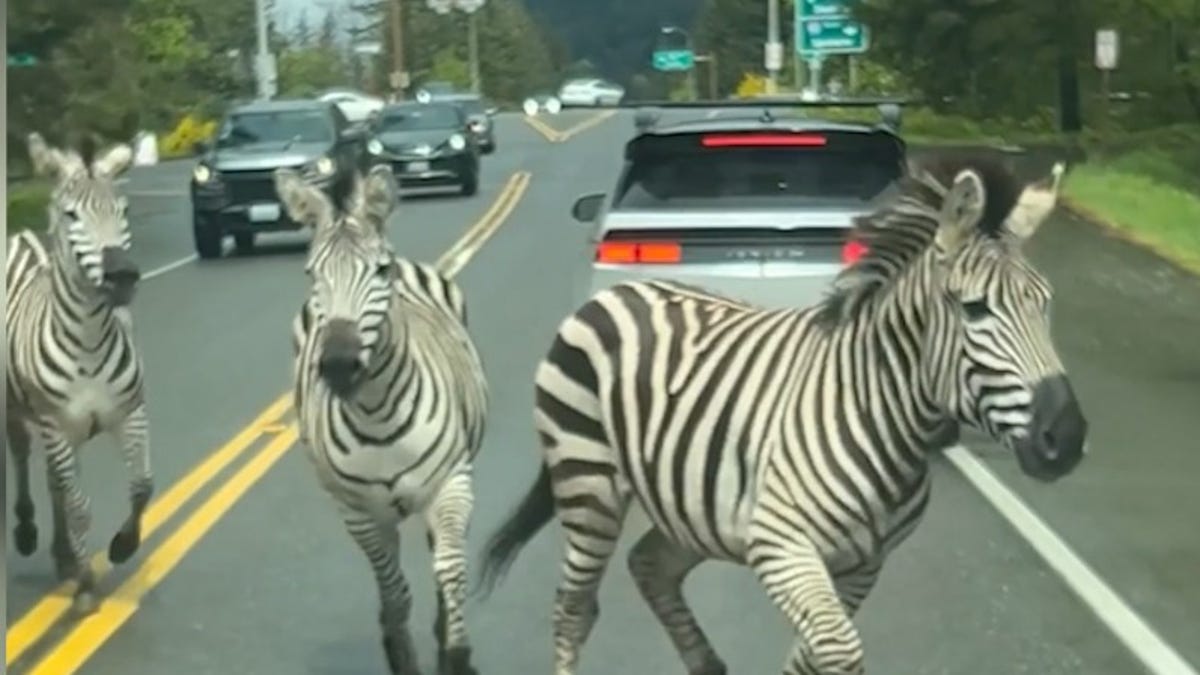
“No people were injured in the incident, and the three animals that were re-captured seem to be in good condition as well with no injuries.”
Drivers in Washington state were in for a surprise when they spotted a group of zebras, possibly inspired their friend Marty from “Madagascar,” galloping on the highway.
Washington State Patrol, in an email to USA TODAY, said that four zebras were on their way to Montana, when the driver of their trailer stopped off an exit to secure the trailer that had reportedly become unsecure. The four ‒ which included two adult mares, one stallion and one filly ‒ saw it as an opportunity and escaped from the trailer, running amok on the highway.
While officials and passersby were able to corral three of the zebras, a fourth, the stallion, continues to remain loose, the spokesperson said Monday morning.
No injuries reported
Cameron Satterfield, a spokesperson of the Regional Animal Services of King County, confirmed the same, adding that the three zebras who were corralled were returned to their owner, while the fourth remains at large.
Satterfield said that a “nearby good Samaritan with a horse pasture was able to help corral the zebras.”
“The zebras’ owner was able to bring their trailer to the pasture to pick up the three that were captured and make sure they were secured,” Satterfield said via email. “No people were injured in the incident, and the three animals that were re-captured seem to be in good condition as well with no injuries.”
An investigation report viewed by USA TODAY showed that the incident took place shortly before 1 p.m. Sunday. The owner of the four zebras, Kristine Keltgen was driving them from Winlock, Washington to Anaconda, Montana when she noticed the trailer’s “floor mat flapping and dragging.” As Keltgen stopped and opened the door of the trailer to adjust the mat, the zebras rushed out of the trailer and onto the roadway.
Video footage from the incident, captured by passersby, shows the zebras trotting on the highway among cars and munching on grass before making their way to the backyard of a house near the highway.
Zebras run wild along Washington state highway
Video captured the moments when four zebras were seen running though traffic in Washington state.
‘They’re in my yard’
Whitney Blomquist, who lives at the house, where the zebras wound up, told KOLOTV that she was shocked to see the zebras in her backyard.
“I called someone and was like, ‘Um, so I found the missing zebras. They’re in my yard,” Blomquist said. “Uh, you know, not sure what to do.’”
Blomquist told KOMO News that her security cameras have caught bears multiple times, but spotting the zebras was a first.
“I’ve had plenty of bears in my yard, but this was a new one, for sure,” Blomquist said.
One of the drivers on the highway Dan Barnett told KOLO TV that several cars on the off-ramp pulled over by the guardrail to contain the zebras and prevent them from escaping onto the interstate where they could be hit by speeding vehicles.
Authorities have requested anyone who spots the 4th zebra to call RASKC at 206-296-7387 or law enforcement at 911. Meanwhile, the other 3 continue to be transported back to Montana, according to the investigation report.
Saman Shafiq is a trending news reporter for USA TODAY. Reach her at sshafiq@gannett.com and follow her on X @saman_shafiq7.
Washington
Meet the 2024 Washington Women in Journalism Award Winners

Print Journalism
Carol Leonnig
The Washington Post
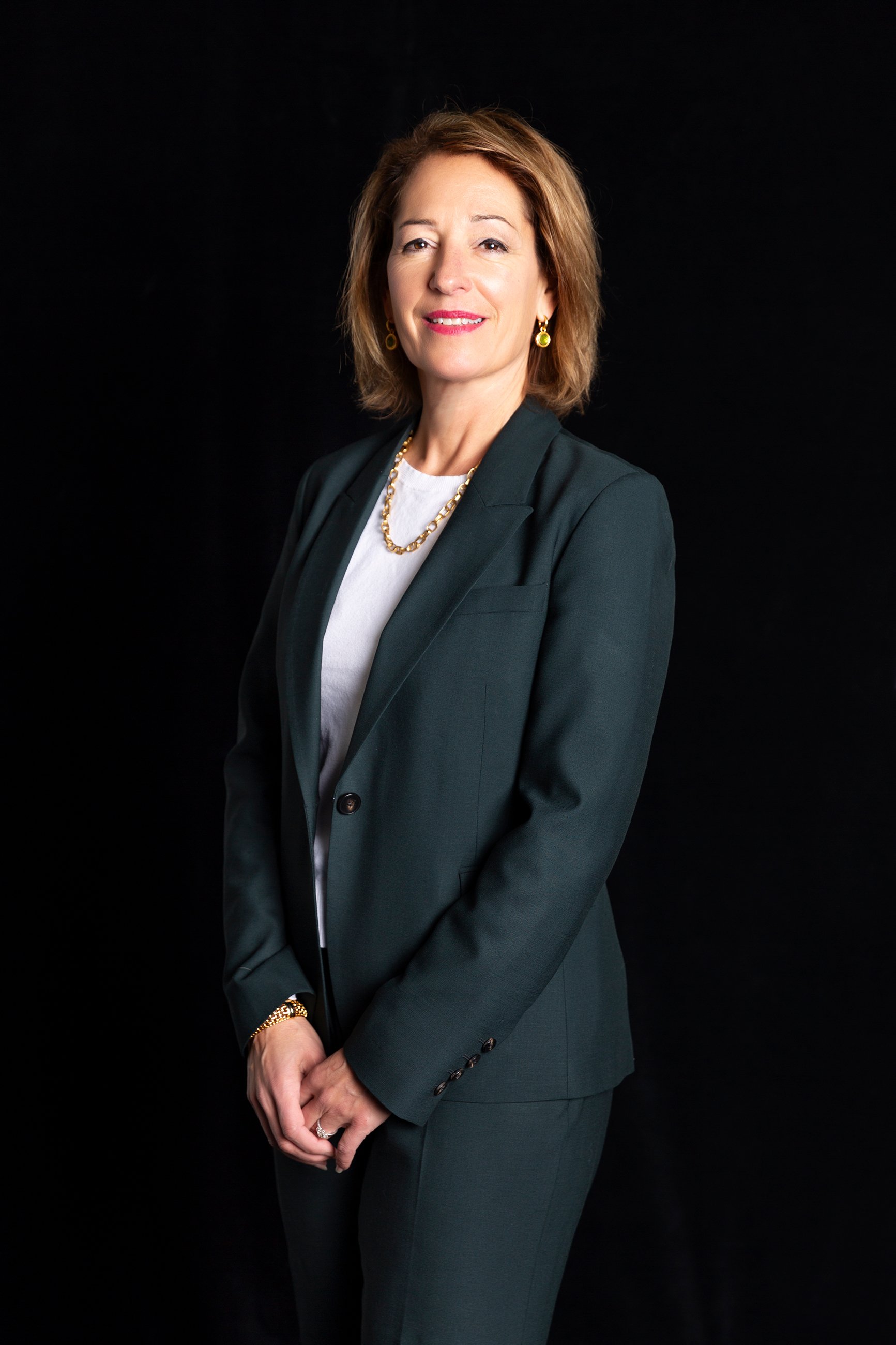
Carol Leonnig has spent much of her career reporting on local, state, and federal governments. Her hard-hitting investigations into the White House and federal agencies have earned her or teams she worked on four Pulitzer Prizes. At the Washington Post since 2000, she’s also an on-air contributor to NBC News and MSNBC and the author or coauthor of three New York Times bestsellers, including Zero Fail: The Rise and Fall of the Secret Service.
Where she grew up: Upper Marlboro.
First byline: “When I was a freshman, I got drafted by the editor of [the Bryn Mawr–Haverford College News] to report on a sledding accident involving students behind our dorm. She assigned me to go to the campus security office and look through their paper logs of how they responded to the accident, because there was a huge delay in getting emergency personnel to the site. I was able to piece together what caused the delay, and I was hooked.”
First journalism job: “In my senior year, I wrote some freelance pieces for the Philadelphia Inquirer. I ended up working there after college.”
First big story: “At the Charlotte Observer, I reported that the governor had overwritten state officials and career public servants’ recommendations to replace bridges [that were at risk of falling down] to get a big, new $8 million bridge built to help his neighbors in a rural community more quickly get from point A to point B. It was on the front page. We found out that the FBI was investigating the governor, and he held a press conference the next day and apologized.”
Hardest story she’s ever done: “Some of the hardest are the ones with people who don’t have boldface names. They are going through incredible trauma, like a mass shooting. The greatest honor that can be bestowed on us is to be entrusted to bring their experiences to a larger readership.”
Hardest part of her job: “Keeping your wits about you when you are being attacked in a very vicious way. The division in our country is so brutal in its attacks on journalists who report things that are factually true but that people don’t want to hear.”
Best journalism advice she’s received: “In the heat of the moment, in this competitive field, don’t let competition drive your decision. Stick to checking and rechecking every fact. No one will remember who published a minor story five minutes faster. Everyone will remember a mistake made in the rush of competition.”
Broadcast Journalism
Back to Top
Rachel Scott
ABC News
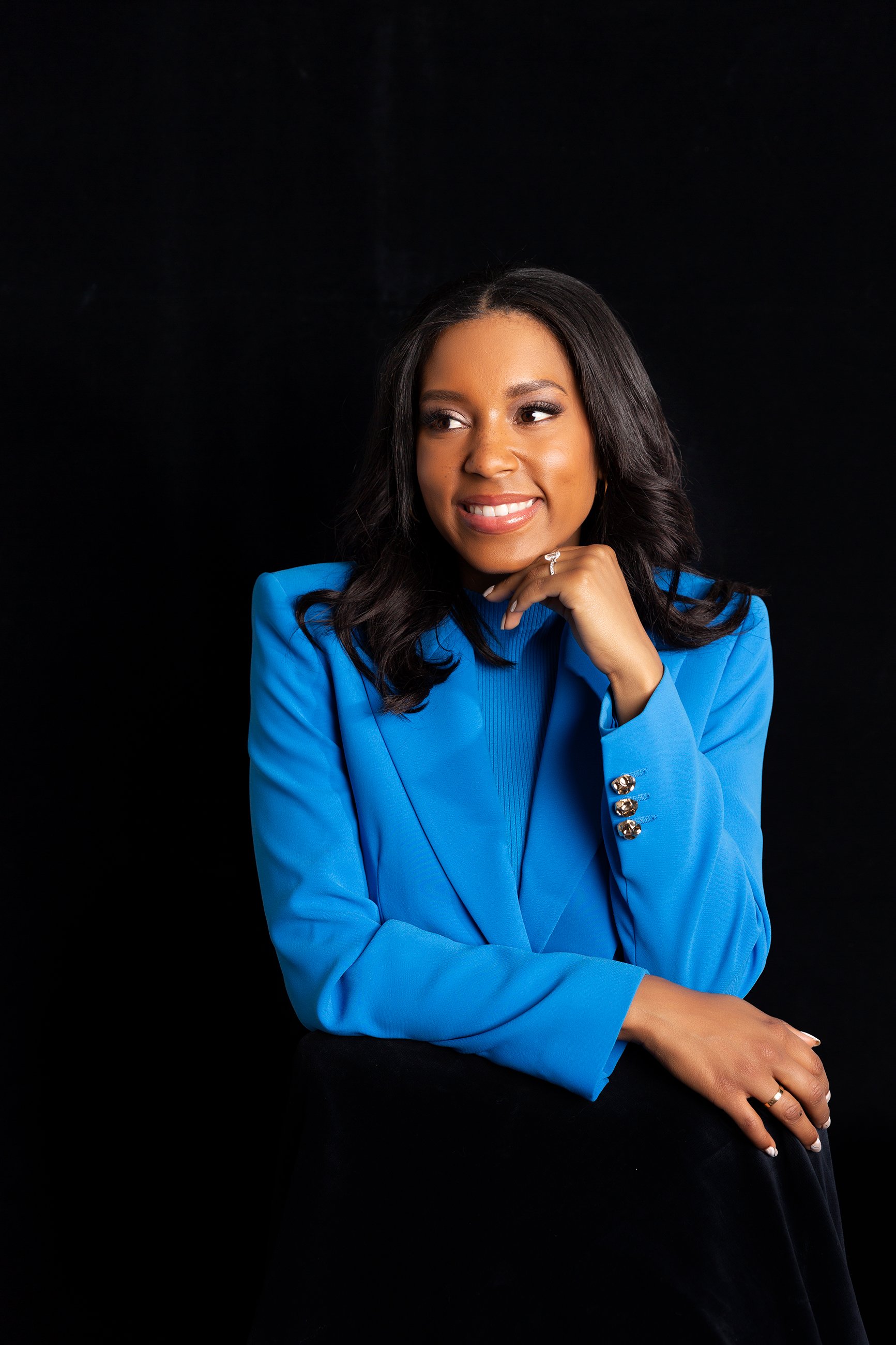

When Rachel Scott started reporting on Capitol Hill for ABC News in 2021, she couldn’t have predicted what she’d be covering her first day–January 6. The job has kept her on her toes ever since: taking her to Geneva, where she pressed Vladimir Putin on human rights; to Texas, where her coverage on the abortion ban earned her a Peabody Award; and to offices all over Capitol Hill.
Where she grew up: Diamond Bar, California.
First journalism job: Production associate for ABC News Live.
What drew her to journalism: “It wasn’t until I had an internship at the White House in 2012 that I discovered my passion for political journalism. I had the opportunity to sit in on several interviews that President Barack Obama did with Diane Sawyer and Barbara Walters, and it was in those rooms I realized that I wanted to be the one asking the tough questions on behalf of the American people.”
On covering January 6: “I was assigned to be outside of the Capitol for what was described as a Trump rally. I remember when things took a crazy turn. George Stephanopoulos asked me to describe what was going on, and what I described was chaos as rioters started to storm the Capitol. I reported outside for hours, stretching into the very late evening.”
Work she’s proudest of: “I traveled to Geneva for President Biden’s high-stakes meeting with Vladimir Putin, and we found out the day before that President Biden and Putin would be holding separate press conferences. I entered [Putin’s] press conference not knowing if he’d call on an American journalist. But he did. When I was called on, I raised the case of Alexei Navalny. I asked President Putin why all of his political prisoners were either dead, in prison, or poisoned. I asked what he was so afraid of. Coming back to my hotel that night, there were students gathered below the balcony of the hotel. They noticed me and started shouting, ‘Freedom of the press!’ In that moment, I understood the gravity of the questions we ask and how much it matters.”
One female journalist she admires: “Diane Sawyer—without question. When I was a USC student, Diane Sawyer came and spoke to journalism students. She told us, ‘Journalism is the business of changing the world.’ I have never forgotten it. When I came to ABC and started covering reproductive rights, Diane reached out to partner on a special. To reach out and partner with a younger journalist speaks volumes to what she has done for women in this industry.”
Lifetime Achievement
Back to Top
Kara Swisher
Vox Media/Podcaster
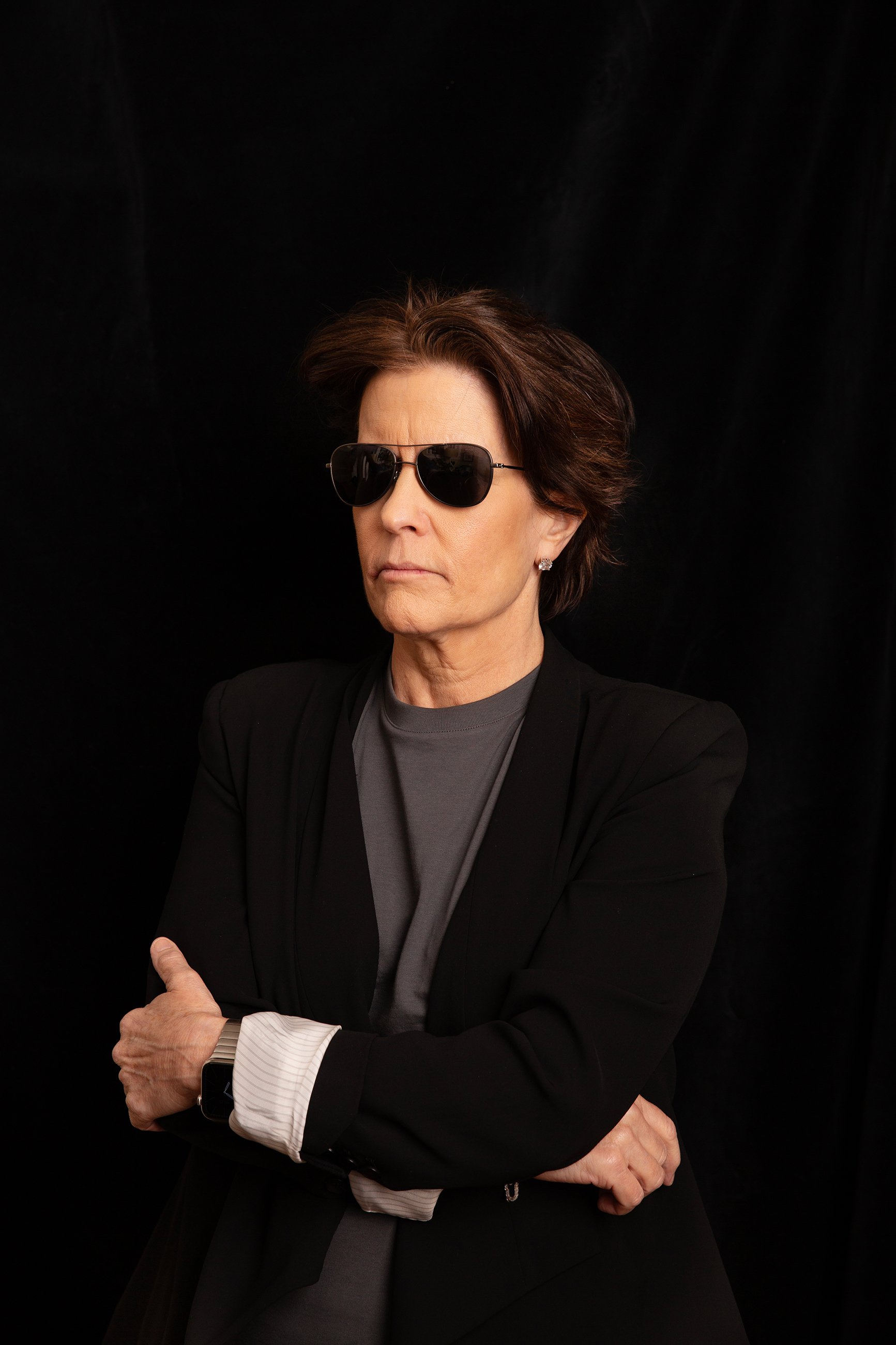

One of the earliest reporters on the internet beat, Kara Swisher has interviewed nearly every influential innovator and entrepreneur in the tech world. Between her commentary on CNN and her hit podcasts, On With Kara Swisher and Pivot, she has a knack for catching the latest scoops on the fast-moving industry. In her recent bestselling memoir, Burn Book: A Tech Love Story, Swisher gives an insider perspective into Silicon Valley’s titans and the impact of their innovations on our world.
Where she grew up: “A lot of places—Long Island and Princeton, New Jersey, principally.”
First byline: “I wrote columns at the Hoya at Georgetown University. I just wrote about campus life and things that affected students.”
First journalism job: “I started writing similar stories for the Washington Post. I was their stringer from the campus.”
First big story: “There was a family in Washington who was one of the wealthiest—they owned a string of retail stores. I wrote about the breakup of the family. Herbert Haft and Robert Haft—they were father and son, and they had a war. It was sort of like King Lear.”
What drew her to journalism: “I’m a curious person, and I like asking questions. I’m a good writer. I wasn’t good at other things. I wanted to be an architect, and I wasn’t good at that.”
One hard thing about her job: “Reporters play a really important part in society, and the current attacks on them are depressing and stupid.”
Best journalism advice she’s received: “Walt Mossberg, who I dedicated my book to, always was like, ‘Just go and find the truth and ask direct questions.’ It’s not very complicated, but I think it’s really important to do what you do with integrity and intelligence, as well as try to be interesting and be interested at the same time.”
A piece of advice she’d share to budding journalists: “Just work hard and ask good questions. You have to know what you’re talking about. You have to be accurate. You have to be prepared. Constantly assess what you need to improve on.”
What she’d like to see change to make the journalism industry better for women: “Hire the most diverse groups of people. I mean not just race and gender but backgrounds and political affiliation. I think it’s better to get different perspectives.”
Star to Watch
Back to Top
Meridith McGraw
Politico
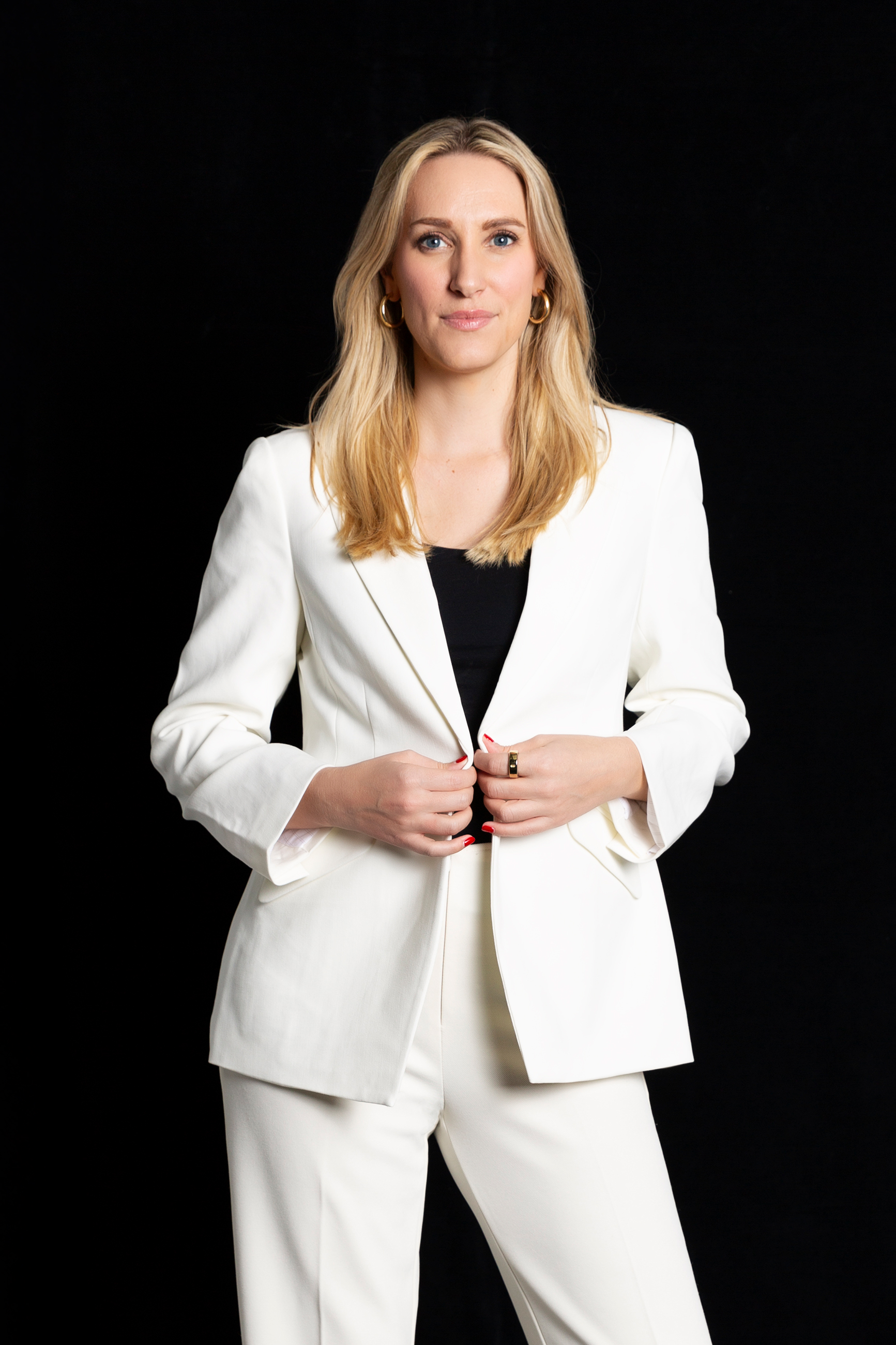

It would be an understatement to say that 2024 has been–and will continue to be–a whirlwind for Meridith McGraw. As Politico’s national political correspondent, she’s in charge of covering all things related to Donald Trump, the 2024 election, and Republican politics. Prior to joining Politico in 2019, she covered the White House and Capitol Hill for ABC News.
Where she grew up: Vienna, West Virginia.
What drew her to journalism: “I love to write. I’m interested in politics. And I grew up with parents who encouraged debate and conversation around the dinner table on what was going on in the world.”
First journalism job: “The Frank Reynolds Fellowship at ABC News. I went to Columbia Journalism School and had my eye on that internship from day one. I really wanted to come to Washington.”
First byline: “A very short story on the National Zoo’s new baby panda, which anybody in DC knows is a big deal.”
Hardest story she’s ever done: “It’s hard to pinpoint one story. [My first year at Politico] was such a challenging time. It was during the pandemic, and I was on the White House team. Nobody knew what was going on in terms of Covid. The George Floyd protests were happening. It was a particularly important and challenging time to be a reporter in DC.”
Best journalism advice she’s received: “Try to zig when other people zag. Think of unexpected or uncovered angles to the stories that everybody’s reading.”
Most challenging aspect of covering Trump: “At times, it feels hard to keep up with the volume of news. That’s why it’s important to cut through the noise and help people discern the most important things they need to know.”
How she stays sane covering politics in 2024: “I’m really lucky to have great friends and family, and an adorable dog [Daisy, a basset hound], but a big part of it is understanding the historic importance of the moment we’re in.”
What she’d like to see change in the journalism industry to make it better for women: “Pay equity continues to be something we need to see [improve].”
Favorite part of the job: “I’m happy not being the smartest person in the room and getting to learn from other people. I love that this job allows me to call up lawmakers, expert thinkers, [and] everyday people I wouldn’t normally encounter.”
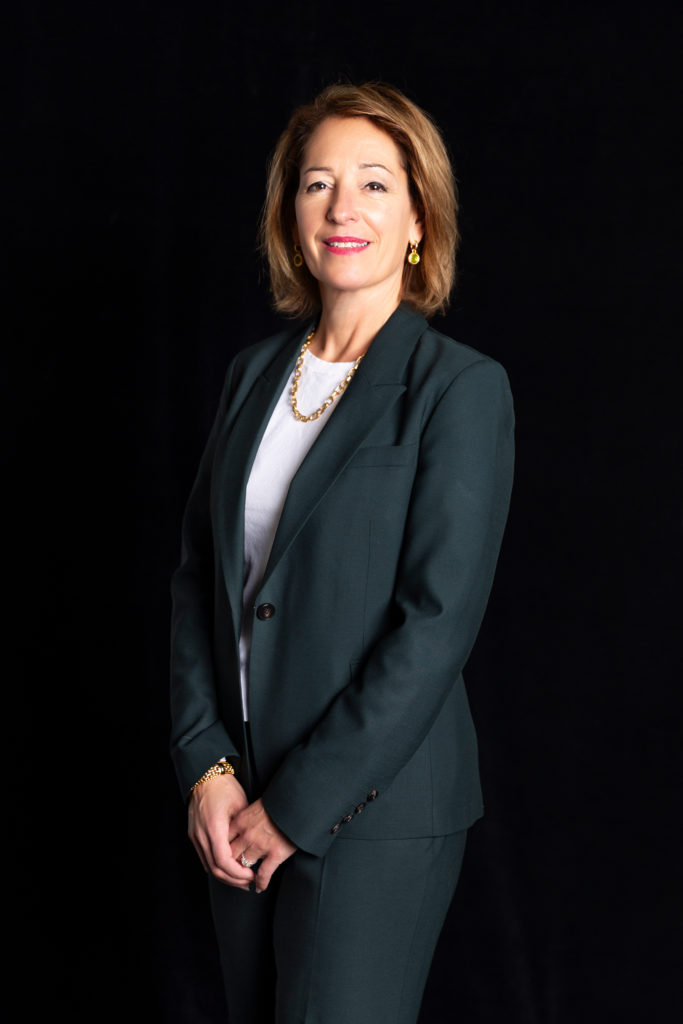

Print Journalism
Back to Top
Carol Leonnig
The Washington Post
Carol Leonnig has spent much of her career reporting on local, state, and federal governments. Her hard-hitting investigations into the White House and federal agencies have earned her or teams she worked on four Pulitzer Prizes. At the Washington Post since 2000, she’s also an on-air contributor to NBC News and MSNBC and the author or coauthor of three New York Times bestsellers, including Zero Fail: The Rise and Fall of the Secret Service.
Where she grew up: Upper Marlboro.
First byline: “When I was a freshman, I got drafted by the editor of [the Bryn Mawr–Haverford College News] to report on a sledding accident involving students behind our dorm. She assigned me to go to the campus security office and look through their paper logs of how they responded to the accident, because there was a huge delay in getting emergency personnel to the site. I was able to piece together what caused the delay, and I was hooked.”
First journalism job: “In my senior year, I wrote some freelance pieces for the Philadelphia Inquirer. I ended up working there after college.”
First big story: “At the Charlotte Observer, I reported that the governor had overwritten state officials and career public servants’ recommendations to replace bridges [that were at risk of falling down] to get a big, new $8 million bridge built to help his neighbors in a rural community more quickly get from point A to point B. It was on the front page. We found out that the FBI was investigating the governor, and he held a press conference the next day and apologized.”
Hardest story she’s ever done: “Some of the hardest are the ones with people who don’t have boldface names. They are going through incredible trauma, like a mass shooting. The greatest honor that can be bestowed on us is to be entrusted to bring their experiences to a larger readership.”
Hardest part of her job: “Keeping your wits about you when you are being attacked in a very vicious way. The division in our country is so brutal in its attacks on journalists who report things that are factually true but that people don’t want to hear.”
Best journalism advice she’s received: “In the heat of the moment, in this competitive field, don’t let competition drive your decision. Stick to checking and rechecking every fact. No one will remember who published a minor story five minutes faster. Everyone will remember a mistake made in the rush of competition.”
Broadcast Journalism
Back to Top
Rachel Scott
ABC News
When Rachel Scott started reporting on Capitol Hill for ABC News in 2021, she couldn’t have predicted what she’d be covering her first day–January 6. The job has kept her on her toes ever since: taking her to Geneva, where she pressed Vladimir Putin on human rights; to Texas, where her coverage on the abortion ban earned her a Peabody Award; and to offices all over Capitol Hill.
Where she grew up: Diamond Bar, California.
First journalism job: Production associate for ABC News Live.
What drew her to journalism: “It wasn’t until I had an internship at the White House in 2012 that I discovered my passion for political journalism. I had the opportunity to sit in on several interviews that President Barack Obama did with Diane Sawyer and Barbara Walters, and it was in those rooms I realized that I wanted to be the one asking the tough questions on behalf of the American people.”
On covering January 6: “I was assigned to be outside of the Capitol for what was described as a Trump rally. I remember when things took a crazy turn. George Stephanopoulos asked me to describe what was going on, and what I described was chaos as rioters started to storm the Capitol. I reported outside for hours, stretching into the very late evening.”
Work she’s proudest of: “I traveled to Geneva for President Biden’s high-stakes meeting with Vladimir Putin, and we found out the day before that President Biden and Putin would be holding separate press conferences. I entered [Putin’s] press conference not knowing if he’d call on an American journalist. But he did. When I was called on, I raised the case of Alexei Navalny. I asked President Putin why all of his political prisoners were either dead, in prison, or poisoned. I asked what he was so afraid of. Coming back to my hotel that night, there were students gathered below the balcony of the hotel. They noticed me and started shouting, ‘Freedom of the press!’ In that moment, I understood the gravity of the questions we ask and how much it matters.”
One female journalist she admires: “Diane Sawyer—without question. When I was a USC student, Diane Sawyer came and spoke to journalism students. She told us, ‘Journalism is the business of changing the world.’ I have never forgotten it. When I came to ABC and started covering reproductive rights, Diane reached out to partner on a special. To reach out and partner with a younger journalist speaks volumes to what she has done for women in this industry.”
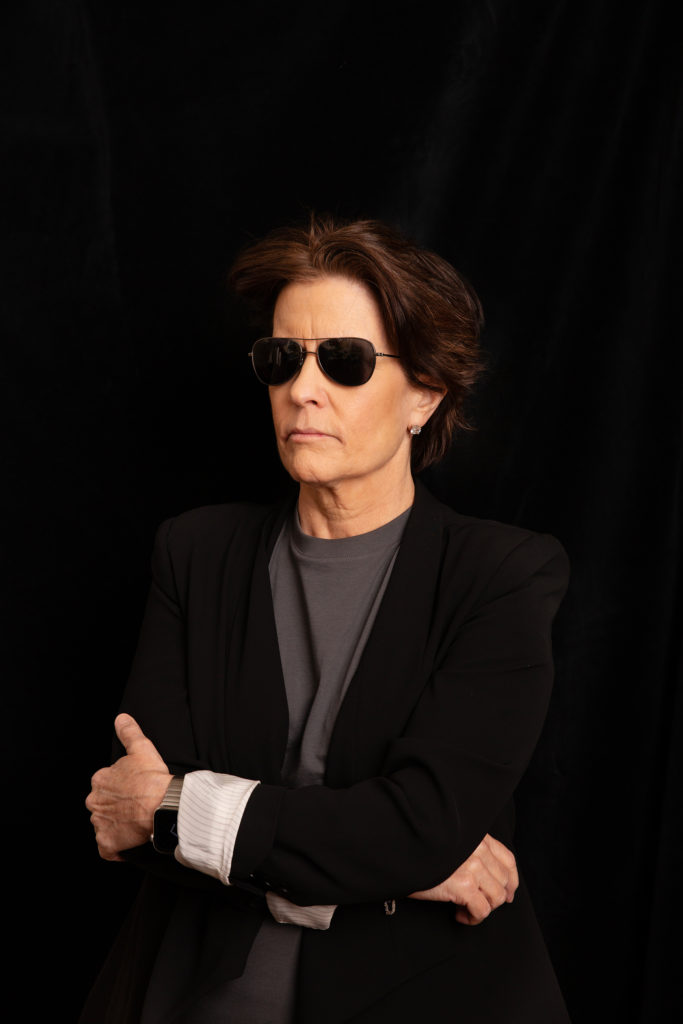

Lifetime Achievement
Back to Top
Kara Swisher
Vox Media/Podcaster
One of the earliest reporters on the internet beat, Kara Swisher has interviewed nearly every influential innovator and entrepreneur in the tech world. Between her commentary on CNN and her hit podcasts, On With Kara Swisher and Pivot, she has a knack for catching the latest scoops on the fast-moving industry. In her recent bestselling memoir, Burn Book: A Tech Love Story, Swisher gives an insider perspective into Silicon Valley’s titans and the impact of their innovations on our world.
Where she grew up: “A lot of places—Long Island and Princeton, New Jersey, principally.”
First byline: “I wrote columns at the Hoya at Georgetown University. I just wrote about campus life and things that affected students.”
First journalism job: “I started writing similar stories for the Washington Post. I was their stringer from the campus.”
First big story: “There was a family in Washington who was one of the wealthiest—they owned a string of retail stores. I wrote about the breakup of the family. Herbert Haft and Robert Haft—they were father and son, and they had a war. It was sort of like King Lear.”
What drew her to journalism: “I’m a curious person, and I like asking questions. I’m a good writer. I wasn’t good at other things. I wanted to be an architect, and I wasn’t good at that.”
One hard thing about her job: “Reporters play a really important part in society, and the current attacks on them are depressing and stupid.”
Best journalism advice she’s received: “Walt Mossberg, who I dedicated my book to, always was like, ‘Just go and find the truth and ask direct questions.’ It’s not very complicated, but I think it’s really important to do what you do with integrity and intelligence, as well as try to be interesting and be interested at the same time.”
A piece of advice she’d share to budding journalists: “Just work hard and ask good questions. You have to know what you’re talking about. You have to be accurate. You have to be prepared. Constantly assess what you need to improve on.”
What she’d like to see change to make the journalism industry better for women: “Hire the most diverse groups of people. I mean not just race and gender but backgrounds and political affiliation. I think it’s better to get different perspectives.”


Star to Watch
Back to Top
Meridith McGraw
Politico
It would be an understatement to say that 2024 has been–and will continue to be–a whirlwind for Meridith McGraw. As Politico’s national political correspondent, she’s in charge of covering all things related to Donald Trump, the 2024 election, and Republican politics. Prior to joining Politico in 2019, she covered the White House and Capitol Hill for ABC News.
Where she grew up: Vienna, West Virginia.
What drew her to journalism: “I love to write. I’m interested in politics. And I grew up with parents who encouraged debate and conversation around the dinner table on what was going on in the world.”
First journalism job: “The Frank Reynolds Fellowship at ABC News. I went to Columbia Journalism School and had my eye on that internship from day one. I really wanted to come to Washington.”
First byline: “A very short story on the National Zoo’s new baby panda, which anybody in DC knows is a big deal.”
Hardest story she’s ever done: “It’s hard to pinpoint one story. [My first year at Politico] was such a challenging time. It was during the pandemic, and I was on the White House team. Nobody knew what was going on in terms of Covid. The George Floyd protests were happening. It was a particularly important and challenging time to be a reporter in DC.”
Best journalism advice she’s received: “Try to zig when other people zag. Think of unexpected or uncovered angles to the stories that everybody’s reading.”
Most challenging aspect of covering Trump: “At times, it feels hard to keep up with the volume of news. That’s why it’s important to cut through the noise and help people discern the most important things they need to know.”
How she stays sane covering politics in 2024: “I’m really lucky to have great friends and family, and an adorable dog [Daisy, a basset hound], but a big part of it is understanding the historic importance of the moment we’re in.”
What she’d like to see change in the journalism industry to make it better for women: “Pay equity continues to be something we need to see [improve].”
Favorite part of the job: “I’m happy not being the smartest person in the room and getting to learn from other people. I love that this job allows me to call up lawmakers, expert thinkers, [and] everyday people I wouldn’t normally encounter.”
Back to Top
Past Winners
2023
Jacqueline Alemany
The Washington Post
Gloria Borger
CNN
Asma Khalid
NPR
Kelly O’Donnell
NBC
2022
Kaitlan Collins
CNN
Kathleen Parker
The Washington Post
Martha Raddatz
ABC
Ayesha Rascoe
NPR
2021
Yamiche Alcindor
PBS
Karen Attiah
The Washington Post
Susan Glasser
The New Yorker
Norah O’Donnell
CBS
2020
Molly Ball
Time
Rita Braver
CBS
Anna Palmer
Politico
Kristen Welker
NBC
2019
Andrea Mitchell
NBC
Ashley Parker
The Washington Post
Abby Phillip
CNN
Amanda Terkel
HuffPost
2018
Amanda Bennett
Voice of America
Audie Cornish
NPR
Lynn Sweet
The Chicago Sun-Times
Amy Walter
The Cook Political Report
2017
Mary Katharine Ham
CNN
Mary Louise Kelly
NPR
Jane Mayer
The New Yorker
Cokie Roberts
NPR/ABC/PBS
2016
Dana Bash
CNN
Kathryn Lopez
National Review
Susan Page
USA Today
Carolyn Ryan
The New York Times
This article appears in the May 2024 issue of Washingtonian.
-

 World1 week ago
World1 week agoShipping firms plead for UN help amid escalating Middle East conflict
-

 Politics1 week ago
Politics1 week agoICE chief says this foreign adversary isn’t taking back its illegal immigrants
-

 Politics1 week ago
Politics1 week ago'Nothing more backwards' than US funding Ukraine border security but not our own, conservatives say
-

 News1 week ago
News1 week agoThe San Francisco Zoo will receive a pair of pandas from China
-

 World1 week ago
World1 week agoBrussels, my love? The EU single market is not sexy enough for voters
-

 World1 week ago
World1 week agoEU sanctions extremist Israeli settlers over violence in the West Bank
-

 Education1 week ago
Education1 week agoVideo: Dozens of Yale Students Arrested as Campus Protests Spread
-

 Politics1 week ago
Politics1 week agoDemocrats hold major 2024 advantage as House Republicans face further chaos, division






